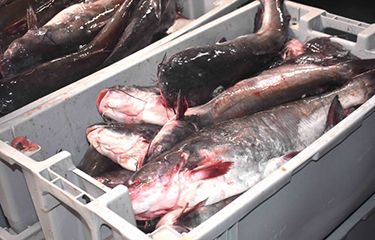Virginia looks to expand blue catfish fishery and processing

The Virginia General Assembly approved USD 250,000 (EUR 232,000) on 6 September to support and encourage blue catfish processing, flash freezing, harvesting and infrastructure projects in an effort to enhance the growth of a blue catfish fishery in the U.S. state.
It voted down a proposal to invest USD 2 million (EUR 1.9 million) grant program to establish the Catfish Industries Development Program, but instead voted to start off with a smaller initiative funded with state seed money. Before it becomes law, however, Virginia Governor George Youngkin must sign off on the budget, which he is expected to do.
The program authorizes the governor to award grants from the Governor's Agriculture and Forestry Industries Development Fund to establish a blue catfish industry in the state. The money will be distributed in reimbursable grants to support blue catfish processing, flash freezing, harvesting of the fish and infrastructure projects. The bill directs the Virginia Secretary of Agriculture and Forestry to develop certain guidelines as provided in the bill on behalf of the governor to facilitate the program.
The blue catfish legislation and funding proposals were sponsored by state Senator Richard Stuart (R-King George County), and state Delegate Keith Hodges (R-Middlesex County).
Hodges said that he was disappointed in the drastic funding cut of the program. but is optimistic that he will be able to obtain more funding during later budget sessions.
“These blue catfish are decimating the menhaden, striped bass and crab populations on the bay,” Hodges said. “They are annually eating a million tons of peanut bunkers [young menhaden]. We have got to find some way to bring them under control and by encouraging a strong commercial fishery to harvest the fish and creating adequate processing facilities – is the answer. The USD 250,000 is a start and hopefully we can get some long-term funding later on to make this fishery grow. We have a lot of bipartisan support in the General Assembly and I’ve heard that Maryland is considering a similar program too."
On 30 August, the Virginia Department of Agriculture and Customer Services (VDACS) - International Marketing Division sponsored a seafood promotional event bringing in international chefs, food critics and writers to visit a blue catfish processing plant Hampton, Virginia.
The group toured the processing plant of L. D. Amory Company Inc. one of only three blue catfish processing plants in the state. Armory Seafood Owner Meade Amory said during the 1970s and 1980s, blue catfish were introduced to the James, Rappahannock, and York river basins as a recreational fish by the Virginia Department of Wildlife Resources. Blue catfish are native to the Mississippi, Ohio, and Missouri rivers. The catfish quickly spread throughout the Chesapeake Bay watershed into nearly every major tributary and are now being seen in North Carolina waters.
“They were introduced near the fall line for recreational fishing because they are supposedly a freshwater fish, but they have quickly adapted to the bay’s brackish and saltwater,” Amory said. “They are now catching blue catfish in the middle of the bay.”
Blue catfish eat shad, herring, striped bass, menhaden, clams, and blue crab. There is now concern that the large catfish population is having a detrimental impact on the populations of these species.
“All of these species are important to the ecosystem and to commercial and recreational fishermen,” Amory said.
Armory said blue catfish are a “really good product” to serve in restaurants and noted that several restaurants in Hampton and throughout the state have it on its menu.
The dozen visitors to Armory plant, who came from as far away as France and Mexico, ate fried catfish along with scallops and crab cakes, all seafood caught in state waters. The meal was served at Graham & Rollins Seafood Market and Restaurant in Hampton.
“There are some people who just do not want to eat catfish but when they taste it they change their minds,” she said. “It really is a good-tasting fish.”
Reporting and photo courtesy of Larry Chowning





Share